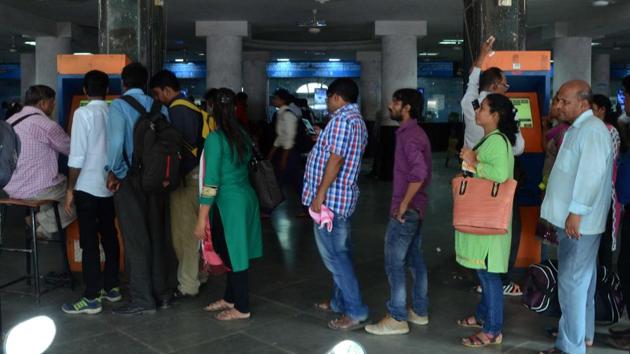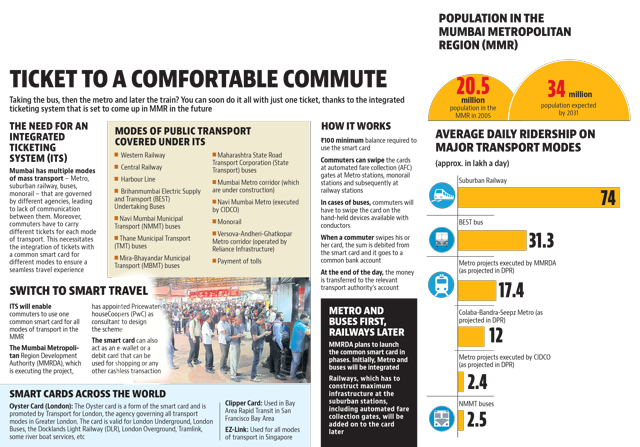Mumbai infra: It’s time to end long queues, it’s time for one city, one ticket
The city needs an integrated transport authority, as the lack of a single command has made transportation planning piecemeal
While every state government in the past two decades has envisioned making Mumbai world-class or global city, none has been able to create a single authority that would issue a single card for travel on different modes of transport.

Mumbai has five modes of transport that are governed by four authorities. The Mumbai Metropolitan Region (MMR) has multiple modes of transport, with different government bodies in charge.
NEED FOR COORDINATION
Taking the need for better coordination between different transport bodies into account, the state, in February 2008, set up Unified Mumbai Metropolitan Transport Authority (UMMTA), a body with heads of different transport bodies, secretaries of the state transport department and urban development department and transport experts. However, according to a senior state bureaucrat, UMMTA “lacked any power”, remaining only an “advisory body”.
Manoj Saunik, principal secretary, state transport department, said Mumbai needs an integrated transport authority, as the lack of a single command has made transportation planning “piecemeal”. “The moment we use the word coordination, there is an acceptance that there will be multiple agencies. Why can’t we have a metropolitan transport system that is integrated just like in most developed countries, where transportation is handled by one authority? It is time mega cities like Mumbai start thinking about setting up a separate transport authority, so Metros, monorail, trains, buses can be integrated…they cannot function as independent organisations. It makes them less efficient,” Saunik said.
Ashok Datar, transport expert and a member of UMMTA, said the body has not met over the past six months. “UMMTA seems to have been abandoned. There have been no meetings for the past five-six months,” Datar said, adding that the government has a “casual and callous approach towards planning”.
Saunik said a single transport authority should be given the task of coming up with a transportation plan for the city. “The authority can see which one needs supplementing, how they can feed off the other to give commuters a seamless experience. There is no holistic planning,” he said.
According to the bureaucrat, citizens and the media can help make the climate conducive for action. “We are advocating it,” he said.
SOLUTION IN SIGHT
By 2019, you will be able to use one card to commute on any mode of transport in the Mumbai Metropolitan Region (MMR). The Mumbai Metropolitan Region Development Authority (MMRDA), implementing the integrated ticketing system (ITS) project, is pushing to operationalise a common mobility card by December-end.
Integrated ticketing system, also known as single ticket system, is the first-of-its-kind project in the country that will allow commuters to use a smart card for multi-modal corridors. It means you can use one ticket to travel in different modes of transport. The cost of the project is around ₹130 crore. Several international cities have such a system.
The plan to have a common card for all modes of transport has been on the table for a decade, but it never took off owing to coordination and “technical” issues, a senior state bureaucrat said. Across the globe, specifically in cities and countries namely London, Singapore, San Francisco, Dubai, Helsinki, Tokyo, Seoul, Hong Kong, etc, transport agencies have employed single cards for multiple modes of transport.
Currently, commuters have to stand in queues to buy tickets or recharge smart cards from each operator. The proposed system will eliminate ticket queues. “We are currently in the bidding stage, and will award the contract in two months. After that, it will take around 10 months to operationalise it,” said Sanjay Khandare, additional metropolitan commissioner, MMRDA.
HOW IT WILL WORK
Once operational, commuters will have to load a minimum of ₹100 to start using the smart card. Commuters can swipe the cards on hand-held devices or the automated fare collection (AFC) gates at Metro stations, monorail and subsequently at railway stations, once the infrastructure is set up. In case of buses, commuters will have to swipe the card for tickets on hand-held devices available with the conductors.
Khandare said the project will be implemented in phases, based on infrastructure needs of each mode of transport. “We will connect the Metros, monorail, buses and railway season passes first,” he said. Railways will need maximum infrastructure input, in terms of automated doors.
According to an MMRDA official, commuters will be able to use debit/credit cards on the ticketing machines. Gradually, the MMRDA proposes to move to contactless cards and mobile applications with QR codes to purchase tickets. Officials said a mobile application will also be introduced to make ITS successful. “Commuters will be able to use the system with smart cards and mobile application. Those who do not wish to carry smart cards, can pay online,” said a senior official from MMRDA.
A senior MMRDA official involved in implementation of the project said coordinating with multiple agencies and getting them on-board has been a challenge. The officer said the suburban railways, which have the maximum number of commuters, had several doubts. “One issue they raised was ‘First Rider Risk’. It is basically when a commuter enters the station, if there is less balance or no money in the account, they would suffer a loss. Therefore, it had to be resolved technically. One solution was that to have ₹100 as security deposit on the card,” the officer said.





